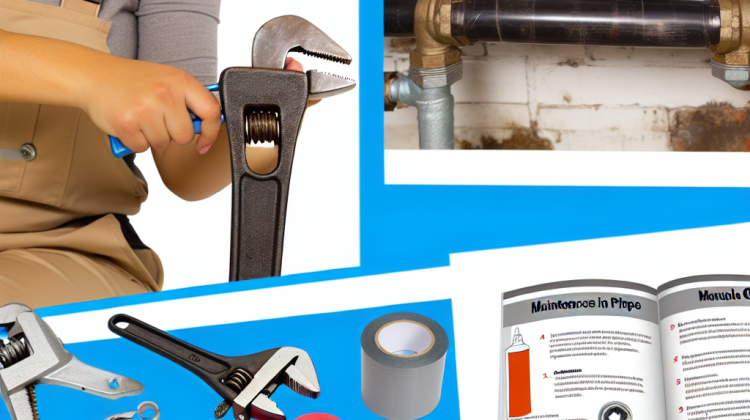
Did you know that the average person uses about 100 gallons of water each day? That’s like filling up a big swimming pool every week! With all that water flowing through, it’s super important to keep our plumbing pipes in tip-top shape. Long ago, people used simple wooden pipes or even clay to move water around, but nowadays, we’ve got fancy metal and plastic pipes that do a much better job. Just think about it—plumbing has come a long way since the ancient Romans used lead pipes! Keeping modern pipes well-maintained is essential for avoiding leaks, clogs, and big headaches.
You might wonder why it’s so crucial to take care of your plumbing. Well, here’s a fun fact: the average American household spends nearly $500 every year on water that gets wasted due to leaks! That’s a whole lot of cash! Taking care of our plumbing not only saves money but also helps save our precious water. A simple drip from a faucet can waste over 3,000 gallons a year! So, knowing how to maintain those pipes can really make a difference.
First off, one of the easiest ways to keep your pipes healthy is to clear out any gunk that builds up. You know how sometimes we forget to clean our rooms, and it gets messy? Pipes can get messy too! Use drain covers or screens to catch hair and food particles before they go down the drain. Sometimes, a mixture of baking soda and vinegar can do wonders when poured down the drain. It’s like giving your pipes a nice little spa day!
Keeping an eye on the temperature is important as well. When it gets really cold outside, pipes can freeze, and that’s no fun—yikes! You wouldn’t want your pipes to burst like a balloon! Keeping your home a cozy temperature, especially for those pipes hidden in the walls, can help prevent this. You can even wrap your pipes in insulation during chilly months to give them an extra layer of protection!
Now, let’s chat about water pressure. While we all love a strong shower, too much water pressure can hurt your pipes. Think of it like a soda bottle—if you shake it too hard, it might explode! You can use a pressure gauge to test how strong your water pressure is. If it’s too high, getting a pressure regulator can help bring it down.
Regularly checking for leaks is also a smart move. Just like you keep an eye on your bike for flat tires, peek around your sinks and toilets for any dripping. If you spot a leak, fix it ASAP. Even small leaks can cause big problems down the road.
Lastly, remember to call a plumber if you run into any serious issues. They’re like the superheroes of plumbing! Trying to fix everything by yourself might lead to bigger messes. Don’t hesitate to reach out for help when you need it; it’s the smartest choice. Maintaining plumbing pipes might seem a bit tricky, but with these tips, you’ll be a plumbing maintenance whiz in no time!
How to Maintain Plumbing Pipes
Keeping your plumbing pipes in tip-top shape isn’t rocket science, but it sure does require a bit of care. Let’s jump right into some easy ways to maintain those pipes so you can avoid messy leaks and costly repairs!
Check for Leaks Regularly
First things first, always be on the lookout for leaks. You know how they say, “a stitch in time saves nine”? Well, that’s true with plumbing, too! If you notice any damp spots, drips, or puddles near your pipes, it’s time to act. Just grab a flashlight and check under sinks or behind appliances. The sooner you catch a leak, the easier it’ll be to fix!
Keep Drains Clear
Next up, let’s talk about those drains! Hair, soap, and other gunk can build up over time. Here’s what you can do:
- Use a drain strainer to catch hair and debris.
- Pour some hot water down the drain once a week. This helps clear out #gunk# that might slow things down.
- For tougher clogs, mix baking soda and vinegar. It’s like a mini science experiment that helps break things down!
Insulate Pipes in Cold Weather
When winter rolls around, make sure to keep your pipes warm! You don’t want them freezing up. Here’s how:
- Wrap pipes in foam insulation or towels to keep them cozy.
- Open cabinet doors under sinks to let warm air in.
- Let a small trickle of water run from faucets during really chilly nights.
Mind the Water Pressure
Too much water pressure can be bad news for your pipes. It can lead to leaks and bursts, and that’s definitely not fun. You can check your water pressure with a gauge from a hardware store:
- If it’s over 60 psi, you might want to look into pressure regulators.
- Talking to a plumber can help you find the best solution!
Watch What You Flush
It’s easy to think that toilets can handle anything, but that’s just not true. Make sure to only flush toilet paper and human waste:
- No wipes, even the “flushable” kind – they can cause major blockages.
- Keep trash cans nearby to dispose of anything else.
Schedule Regular Maintenance
Just like you take your car for a tune-up, your plumbing needs regular check-ups too! A plumber can inspect everything, ensuring it’s all working well. They’ll catch minor issues before they turn into big headaches.
Know Your System
Lastly, it pays to know the basics of your plumbing system. This includes:
- Where the main shut-off valve is located.
- What type of pipes you have, whether it’s PVC, copper, or something else.
- How your drainage system works.
By knowing these things, you’ll feel more in control and be ready to tackle any plumbing challenges that come your way! Fun fact: did you know that fixing leaks can save homeowners about 10% on their water bills? That’s a good chunk of change!
How to Maintain Plumbing Pipes FAQ
What should I do if I have a leaky pipe?
If you’ve got a leaky pipe, don’t panic! First, turn off the water supply to prevent more water from leaking. Then, you can use a towel to dry the area. You might want to put a bucket under the leak to catch water. After that, it’s best to call a plumber to fix it correctly.
How can I prevent pipes from freezing in winter?
To keep your pipes from freezing, make sure to keep your home warm. You can let your faucets drip a little bit, too. This helps the water keep moving and not freeze. Also, cover any outside pipes with foam or blankets for extra warmth!
What does unclogging a drain involve?
Unclogging a drain usually means removing whatever’s stuck in there. You can try using a plunger. If that doesn’t work, a plumbing snake can help reach deeper clogs. Sometimes, you can also pour baking soda and vinegar down the drain to help clear it out!
How often should I check my plumbing?
It’s a good idea to check your plumbing every six months. Look for leaks, rust, or any spots that look funny. This way, you can catch problems before they get really big!
What’s the best way to clean plumbing pipes?
Cleaning plumbing pipes can be pretty simple! You can pour a mixture of baking soda and vinegar down the drain. Let it sit for about 30 minutes before rinsing it with hot water. This helps keep the pipes nice and clean!
What are signs that I need a plumber?
There are some signs you can look for! If you notice a leak, hear strange noises from your pipes, or have slow drains, it might be time to call a plumber. Also, if your water pressure drops suddenly, don’t ignore it!
Is it okay to use chemical drain cleaners?
Chemical drain cleaners can be strong and harmful. They might work for some clogs, but they can also hurt your pipes. It’s usually better to try the baking soda and vinegar method first!
How do I know if my pipes are clogged?
If water isn’t draining, that’s a big clue! Also, if you see water backing up in sinks or toilets, those are signs of a clog. You might also smell some weird odors if there’s a blockage somewhere.
What should I avoid flushing down the toilet?
Never flush things like wipes, paper towels, or food! These can clog up the pipes and cause a real mess. Stick to toilet paper and human waste only.
Can I do my own plumbing repairs?
You can try small repairs if you’re comfortable! Fixing a leaky faucet or unclogging a drain is often doable. But for big problems, it’s safer to let a pro handle it. Better safe than sorry!
How to Keep Your Plumbing Pipes Healthy
To keep your plumbing pipes in great shape, it’s super important to check for leaks and clogs often. Just like you look after your favorite toys, you should look after your pipes! If you spot a small leak, fix it right away. Even tiny leaks can turn into big problems. Also, don’t forget to check the drains. You can use a drain cover to stop hair and other stuff from getting in. If your sink is a bit slow, use a plunger or a simple mixture of baking soda and vinegar to clear it up. It’s like magic!
Another tip is to keep the pipes warm in the winter. You don’t want them to freeze and burst! Wrap them in insulation or let the faucet drip a little if it gets really cold. Lastly, remember to be careful about what goes down the toilet. No paper towels or wipes! They can jam things up faster than you’d think. By following these easy steps, you’ll help your plumbing pipes stay happy and healthy for a long time. After all, a little bit of care can save you from a big mess later on!
